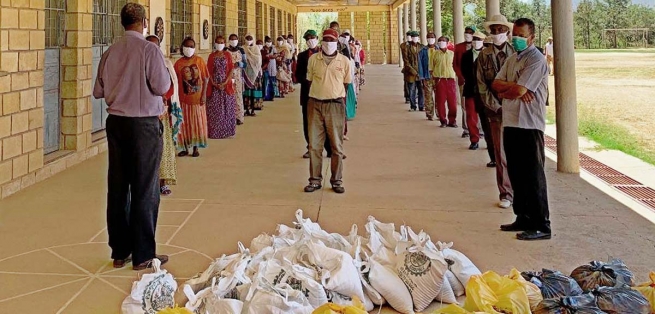ETHIOPIA: Salesian missionaries respond to health emergencies, riots and second wave of locusts

(MissionNewswire) Salesian missionaries are helping those in need in Ethiopia while the country grapples with several emergencies at once. COVID-19 infections are increasing and adding challenges for medical professionals who are still dealing with active outbreaks of cholera, measles and malaria.
The World Health Organization has identified Ethiopia as one of the 13 African states at high risk for the spread of the pandemic. Hospitals are not well equipped. Many communities lack doctors and medical supplies. Most public awareness campaigns are targeted to large cities, leaving outlying areas with little information to fight the virus. In addition, riots between police forces and the Oromo community make it very difficult to comply with coronavirus prevention measures.
The country is also facing its second wave of locusts, which are destroying crops. The Food and Agriculture Organization of the United Nations estimates that around 30,000 hectares of land have already been ruined by locusts.
Salesian missionaries have launched relief efforts to aid youth and families in their 16 vocational training centers in the country. They are distributing food, drinking water and hygiene kits. Salesians have also launched awareness campaigns to promote good practices to prevent coronavirus from spreading.
Salesian missionaries are also working to ensure that families living in Abobo, located between the cities of Gambella and Pugnido in western Ethiopia, have access to the services and resources they need. The majority of the population in Abobo is of Sudanese origin because of its proximity to the border of Sudan. Many people have sought refuge there to escape war and famine.
In 2002, a group of Italian and Spanish volunteers set up the Abobo Health Center in collaboration with local Salesian missionaries. Today, the Abobo Health Center serves as a symbol of the community and provides health services for the more than 4,000 local villagers. The facility has 40 beds, a small ward dedicated to sick children and those suffering from malnutrition, and a small wing that houses obstetrics. Having expanded its reach over the years, the health clinic serves approximately 20,000 people living in the area and the 200,000 people in the entire region.
“The services provided at the Abobo Health Center are critical to this community, especially in the face of coronavirus,” said Father Gus Baek, director of Salesian Missions, the U.S. development arm of the Salesians of Don Bosco. “Salesian missionaries also provide education and social development services for people in the area. Salesians operate a parish, oratory and kindergarten, which has served more than 100 children since its inception. Missionaries also work to ensure the local population has the food and water it needs.”
Ethiopia is one of the poorest countries in the world with more than 38 percent of its population living in poverty, according to Feed the Future. Close to 85 percent of the country’s workforce is employed in agriculture but frequent droughts severely affect the agricultural economy leaving more than 12 million people chronically, or at least periodically, food insecure. In addition, more than two-thirds of the population is illiterate.
The country has 4 million orphans which account for nearly 12 percent of all children and according to UNICEF, more than half a million of these were orphaned as a result of the HIV/AIDS crisis that affected the country. Thousands more children run away each year seeking a better life on the streets.
###
Sources:
ANS Photo (usage permissions and guidelines must be requested from ANS)
Salesian Missions – Ethiopia
UNICEF – Ethiopia





